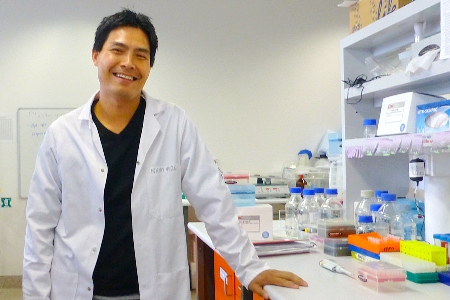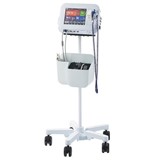Currently, there are no routine screening tests available for oral cancer. However a simple blood test could change that, helping to stem the rise globally of oral cancers such as cancer of the throat, voice box, tongue and mouth.
Dr Nham Tran and PhD candidate Samantha Khoury from UTS's Centre for Health Technologies have invented miLIFE, a blood-based diagnostic test that looks at the profile of small molecules called microRNA to reveal the early warning signs.
The two Sydney researchers have developed an innovative blood-based test that can be administered easily and is painless for the patient.
Khoury explained that the turnaround time for the entire procedure is approximately 48 hours.
"What we are looking for in the blood sample are tiny molecules known as microRNA, which circulate in the blood," Khoury said.
"Levels of five specific microRNA molecules are detected with miLIFE and compared with healthy, non-cancerous individuals. An overabundance or expression of these specific microRNAs will place you in a high risk category and you will be referred to a specialist for further examination.
"You don't need a specialist to administer the test," Khoury continued.
"When you visit your GP for routine checks of cholesterol, vitamin D, haemoglobin and so on, the same blood sample can be used to check for the presence of microRNA biomarkers."
Approximately 300,000 new cases of oral cancer were reported globally in 2012. The main hurdles to treatment are late detection and low awareness of the disease.
Dr Tran.said that warning symptoms for oral cancer include pain, swelling, hoarse voice and difficulty swallowing - all symptoms that can easily be dismissed or misdiagnosed as a common cold.
"The majority of oral cancer patients who visit the doctor have already developed an advanced lesion, but by then it is too late," said Dr Tran.
"At this stage, their diagnosis option is to undergo a tumour biopsy or a fine needle aspiration, both highly invasive and painful procedures.
"We hope that through miLIFE we can provide early intervention to decrease the number of Australians who are diagnosed with oral cancer each year."
The test is being filed under a UTS provisional patent and Dr Tran hopes it will be available to patients within two to three years.
"This technology has been in development since 2006 and has evolved thanks to the ongoing collection of consenting cancer patient samples from surgeons based at several Sydney hospitals. Our collaborations with the Sydney Head and Neck Cancer Institute, the Cancer Council and the Mt Sinai Hospital in New York have provided valuable contributions to this study. We hope to expand this work with the Vellore Christian Medical College Foundation in India.
"This is very pertinent given India has the world's highest rates of oral cancer with 40,000 cases diagnosed each year. The introduction of a robust cancer screen will provide a platform for effective cancer management in low resourced countries."














-160x160-state_article-rel-cat.png)





